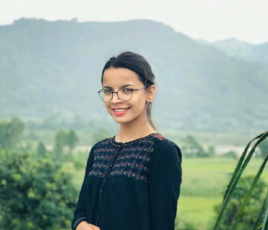Asia-Pacific Mental Health and Well-being Congress
THEME: "Future Directions: Pioneering Mental Health and Well-being Initiatives"
 27-29 Oct 2025
27-29 Oct 2025  Bali, Indonesia
Bali, Indonesia THEME: "Future Directions: Pioneering Mental Health and Well-being Initiatives"
 27-29 Oct 2025
27-29 Oct 2025  Bali, Indonesia
Bali, Indonesia 
Public Health Office, Nepal
Title: Abuse and its associated factors among elderly population of Kamalamai municipality of Sindhuli district, Nepal
Jwala Subedi is a dedicated public health professional currently serving as a Public Health Officer at the Public Health Office, Sindhuli. She holds a Master's in Public Health from B.P. Koirala Institute of Health Sciences, where she graduated as the program topper, and a Bachelor's in Public Health from Manmohan Memorial Institute. Jwala has led and managed impactful health projects, including COVID-19 response efforts supported by Plan International Nepal and maternal health initiatives with GSK and CARE Nepal. She brings strong skills in project management, research, report writing, data analysis, and stakeholder coordination. Her published research focuses on marginalized populations and elderly abuse, with recognition from Ageing Nepal. Proficient in SPSS, Microsoft Office, and both English and Nepali typing, she is passionate about health education, community empowerment, and evidence-based public health practice. Jwala aspires to continue advocating for health equity while contributing to meaningful improvements in Nepal's healthcare system.
Background: The global rise in the elderly population brings attention to the pressing issue of elder abuse, categorized into physical, psychological, neglect, financial and sexual abuse. According to the World Health Organization (2022), 1 in 6 individuals aged 60 and older has experienced some form of abuse in community setting necessitating increase in awareness and support for older people. This study aimed to assess abuse and its associated factors among elderly population of Kamalamai Municipality of Sindhuli District, Nepal.
Methodology: We conducted a community-based cross-sectional study utilizing both qualitative and quantitative methods. We collected data from June 15 to September 15, 2023. The study involved 398 elderly participants (?60 years). Stratified sampling techniques was used to select participants. For the qualitative study we utilized purposive sampling technique which included two key informant interviews, one in-depth interview and two focus group discussions. We analyzed quantitative data using IBM SPSS version 20 applying bivariate and multivariable logistic regression analysis at 95% confidence interval. For qualitative data, thematic analysis was done.
Results: The mean ± SD age of the elderly participants was (70.8± 8.08) years. Among the total of 398 study participants, (64.1%) participants reported experiencing different forms of abuse. The
study found that neglect (46.0%), psychological abuse (42.5%), and financial abuse (24.4%) were the most common while physical abuse (4.8%) and sexual abuse (2.8%) were less common. Living in a nuclear family (AOR: 2.74, 95% CI: 1.67-4.51) and lower socio-economic status (AOR: 5.42, 95% CI: 2.28-12.92) were significantly associated with increase risk of elder abuse.
Qualitative findings revealed mistreatment, vulnerability, negligence, economic factors, family dynamics, loneliness, financial exploitation, food withholding, physical abuse, and emotional attachment as key aspects of elder abuse.
Conclusion: This study highlights neglect and psychological abuse were the most common forms of elder abuse. These findings emphasize the urgency of implementing programs at the municipal level such as financial support system for elderly individuals from lower socioeconomic backgrounds and education programs for both elderly individuals and their families and caregivers. These initiatives aim to control and reduce the incidence of elder abuse and ensure comprehensive well-being of elderly population.